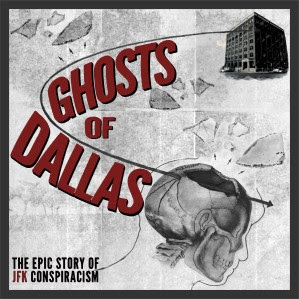I doubt that many things I say in The Ghosts of Dallas podcast will be wholly original. Indeed, we should be suspicious of anyone who claims to have noticed too many things about John F. Kennedy’s murder that have never been noticed before. Given the fantastic amount of scrutiny that’s been applied to the assassination, the odds that anyone will now chance on any radical discoveries about it are poor. All I’ll be trying to do in the podcast is give as clear an account as possible of what the facts say happened in Dallas, and carve a sane path through all the things that have been written and said on the subject since – “the data-spew,” as Don DeLillo called it in his excellent assassination novel Libra, “… an incredible haul of human utterance."
So I’ll be standing on the shoulders of a lot of other writers and researchers as the podcast goes on – many of them heroic, some misguided, and a few who’ll take you straight to Crazy Town if you stay on their shoulders too long.
Source notes for individual episodes appear on the right.
The sources listed below are pantry essentials that I’m bound to make use of multiple times per episode.
The 888-page Report of the Warren Commission (1964), and the 26 volumes of Hearings and Exhibits that were published to accompany it, will always be the first port of call for anyone looking to understand the assassination. Pound for pound, the Warren Report is probably the most unfairly derided document in American history. But despite the hysterical shit-slinging campaign that’s been waged against it for decades, the work of the Warren Commission remains foundational. It’s the concrete slab that all later discussion of the Kennedy assassination – both serious and unserious – has been built on.
Also indispensable is the 1979 Final Report of the House Select Committee on Assassinations, along with its various appendices.
I’m also indebted to the citizen researchers who have painstakingly digitized all these government publications and made them available online. Some of the webmasters who host these resources would reject my views about the assassination entirely, just as I reject theirs. But even when I find their conclusions dubious, I’m grateful for the service they’ve done to all serious students of the case. Thanks to efforts of such people, one can now Google a phrase like “Marina Oswald testimony” and gain instant access to the primary documents. After a while one takes this for granted; but obviously it wouldn’t happen unless a lot of dedicated people had done a ton of work behind the scenes.
My three go-to websites for testimony and documentary evidence are the site of the Mary Ferrell Foundation (www.maryferrell.org); Rex Bradford’s www.history-matters.com; and www.jfk-assassination.net, which was set up by the late John McAdams, who also wrote the very useful book JFK Assassination Logic.
Most of the archival audio in the podcast is sourced from David von Pein’s incredibly well-stocked and useful JFK Channel on YouTube. Helmer Reenberg’s YouTube Channel also has an impressive archive of vintage clips.
As for secondary sources, none surpasses – or will ever surpass – Vincent Bugliosi’s awesome, breeze-block-sized Reclaiming History. Bugliosi’s book is 1,600 pages long, and comes with a CD-ROM containing a further thousand pages’ worth of endnotes. The book must rank as one of the most extraordinary works of non-fiction ever produced by a lone author. It still hasn’t got the credit it deserves and probably never will, because it’s far too long and dense to be easily readable. Anyway, I doubt I’ll be saying much in the podcast that Bugliosi doesn’t say in his book, at one point or another. I hope I can say it more accessibly; but for rigor and thoroughness, Bugliosi remains The Man.
Bugliosi’s much briefer Four Days in November – a narrative account of the assassination and its aftermath carved out from the early pages of his longer opus – is probably the best of the short books about the assassination. Gerald Posner’s Case Closed is also a valuable primer. As for revisionist works, Anthony Summers’s Conspiracy (which has recently been republished as Not in Your Lifetime) is probably the best of them. Summers puts the case for a JFK conspiracy about as well as it can be put – thereby proving, in my view, that the case just isn’t there.
The podcast’s theme tune and artwork are by Mark Free.
My special thanks are due to Charlie Siskel. When this podcast was in an early stage of development, Charlie’s enthusiasm, encouragement and advice were invaluable to me. Thanks, Charlie.
All errors of fact and lapses of taste – and there are bound to be a few – are of course nobody’s fault but mine.
